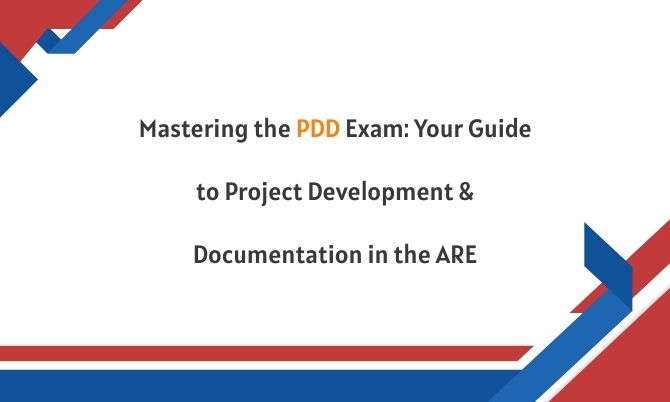The Architect Registration Examination (ARE) is the key to becoming a licensed architect in the United States, administered by the National Council of Architectural Registration Boards (NCARB). This exam series is divided into six divisions, each targeting essential areas of architectural practice:
●Practice Management (PcM)
●Project Management (PjM)
●Programming & Analysis (PA)
●Project Planning & Design (PPD)
●Project Development & Documentation (PDD)
●Construction Evaluation (CE)
Among these, the Project Development & Documentation (PDD) division stands out as one of the most technically demanding exams. It bridges design intent with technical execution, testing a candidate’s ability to prepare, coordinate, and document a design that can move into construction.

The PDD division focuses on how design concepts are translated into construction-ready documentation. It emphasizes:
Integration of building systems (structural, MEP, civil, and specialty systems) Material selection and assembly techniques Evaluation of materials and technologies for constructability and performance Development of detailed design concepts Production of accurate construction documentation
Passing the PDD exam demonstrates that you can move a project from design into reality by ensuring every element - from systems coordination to technical drawings - supports the design intent while meeting code, safety, and performance requirements.
The exam content broadly covers:
Building Systems Integration Structural, mechanical, electrical, plumbing, and specialty systems Coordination of multiple disciplines within the architectural design
Material Selection & Assemblies Understanding construction materials and their performance Choosing appropriate assemblies for durability, safety, and cost-effectiveness
Documentation & Detailing Preparing construction drawings and specifications Detailing assemblies and connections accurately
Codes & Regulations Applying building codes, accessibility standards, and sustainability considerations Ensuring designs meet safety and performance requirements
Construction Techniques Knowledge of construction methods and sequencing Integration of construction techniques into documentation
The PDD exam is a vital part of the ARE because it validates an architect’s ability to:
●Bridge the conceptual phase of design with the technical documentation required for construction
●Ensure that systems and materials work together cohesively
●Produce accurate and buildable documentation that contractors can follow
●Demonstrate competence in one of the most critical stages of the architectural process
In short, PDD proves you are capable of taking architectural ideas and developing them into complete, coordinated, and constructible designs.
The ARE is computer-based, and while each division has its own format, PDD typically includes:
Multiple-choice questions
Check-all-that-apply questions
Drag-and-place questions
Case studies that simulate real-world project documentation challenges
Time is limited, so candidates must balance accuracy with efficiency. Expect the exam to test both conceptual understanding and practical application of technical knowledge.
Review Building Systems Understand how mechanical, electrical, plumbing, and structural systems work together.
Study Material Properties Learn the strengths, weaknesses, and best applications of construction materials.
Practice Reading & Creating Drawings Familiarize yourself with construction documents, detailing, and specifications.
Know the Codes Be comfortable applying the International Building Code (IBC), ADA, and other relevant standards.
Work Through Practice Exams Simulate real exam conditions to improve speed and accuracy.
Focus on Integration Don't study topics in isolation - practice connecting systems, materials, and documentation into one cohesive design.
The Project Development & Documentation (PDD) division of the ARE is more than just a test - it's a validation of your ability to turn architectural concepts into buildable, well-documented projects. By mastering this exam, you demonstrate technical competence, design integration skills, and the ability to prepare construction-ready documentation - critical skills for every licensed architect.